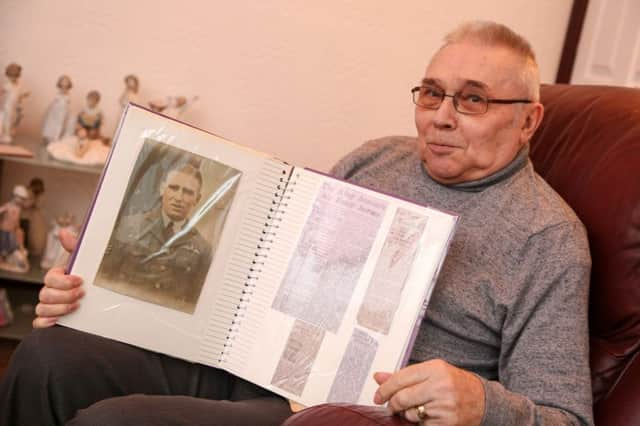Prized commendation of South Shields war hero


He was Thomas Purdy, an RAF captain, who died fighting for the freedom that we cherish so highly today.
Dorothy explained that on September 4, 1939, South Shields-born Thomas, was one of the first RAF crewmen to take part in a bombing raid on Germany.
Advertisement
Hide AdAdvertisement
Hide AdJust two years later, Tom lost his life taking part in another strike against the Nazi war machine.
However, his bravery was recognised the year before when he was awarded the Distinguished Flying Medal.
Tom’s story, like many others who fought in the Second World War, is one of courage and sacrifice.
In a follow-up to Dorothy’s account of Tom’s heroics, his family got in touch, and his son, Ian, is pictured proudly displaying a memento of his father’s bravery.
Advertisement
Hide AdAdvertisement
Hide AdAlso pictured are a photograph of Tom in his RAF uniform, and the citation presented to him “in honour for one who served king and country in the world war of 1939-45 and gave his life to save mankind from tyranny”.
It is a moving tribute to a remarkable man whose memory we all should cherish.
Meanwhile, my thanks go to readers who continue to respond by phone, email and Facebook to previous articles and photographs.
J Raine (nee Robson) wrote to me to say: “I read your article about Binns store. I worked there in the Sixties in the merchandise department. My boss was Jean Pierce, an USDAW union rep.
Advertisement
Hide AdAdvertisement
Hide Ad“I bought my wedding dress there and had my hair done at the hairdressing department on my wedding day nearly 50 years ago.”
A story about evacuees prompted Margaret Walker to go online with the following recollections.
“Your article about evacuees brought back memories for me as I too was evacuated.
“On September 1 I was sent, with my school, to a village in Northumberland, called West Woodburn, where I stayed until 1942 when I went to Dame Allan’s School which was then evacuated to Ambleside.
Advertisement
Hide AdAdvertisement
Hide Ad“In 1943 they returned to Newcastle where I finished my schooling.
“At Christmas time I attended the annual carol service at St Nicolas Cathedral where I met some of the current staff.
“I was a very old girl, being nearly 86-years-old, and was made very welcome, with an invitation to visit the school any time.
“I enjoy the nostalgia articles very much as they bring back so many memories.”
Advertisement
Hide AdAdvertisement
Hide AdFinally, Keith Armstrong got in touch with a poem he had written called My Father Worked On Ships. Here it is:–
My father worked on ships.
They spelked his hands,
dusted his eyes, his face, his lungs.
Those eyes that watered by the Tyne
stared out to sea
to see the world
in a tear of water, at the drop
of an old cloth cap.
For thirty weary winters
he grafted through the snow and the wild winds
of loose change.
He was proud of those ships he built,
he was proud of the men he built with,
his dreams sailed with them:
the hull was his skull,
the cargo his brains.
His hopes rose and sunk
in the shipwrecked streets
of Wallsend and I look at him now
this father of mine who worked on ships
and I feel proud
of his skeletal frame, this coastline
that moulded me
and my own sweet dreams.
He sits in his retiring chair,
dozing into the night.
There are storms in his head
and I wish him more love yet.
Sail with me, breathe in me,
breathe that rough sea air old man,
and cough it up.
Rage, rage
against the dying
of this broken-backed town,
the spirit of its broken-backed
ships.